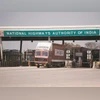)
The GPS-based technology will charge the motorists for the exact distance travelled on the highways, Gadkari said.
A consultant has also been appointed for the implementation of the project, the Road Transport and Highways Minister said in a written reply to Lok Sabha.
At present, FASTags, an electronic toll collection system, is used in which ‘Radio Frequency Identification’ (RFID) technology is employed to make toll payments. The RFID passive tag on the vehicles is used for making payments directly from the customers linked to prepaid or, savings or current account.
How does a GPS-based toll collection system work?
The GPS-based technology will charge the motorists for the exact distance travelled on the highways, Gadkari said. It involves collecting toll payments via satellite-based GPS (Global Positioning System) imaging on vehicles.
Under this system, the money is deducted from the bank accounts with the identification of the vehicle number plate. The number plate recognition is done via automatic number plate reader (ANPR) cameras installed on the highways.
Difference between FASTags and ANPR tech
The current system of FASTags facilitates the process of electronic payment at the toll plaza, which has a scanner. This allows the vehicle to pass through the plaza, without needing to stop. In the case of the GPS-based system, the toll will be deducted based on the distance measured by ANPR technology, thereby making the toll plazas redundant.
Gadkari said that tech-based initiatives are being introduced to improve the efficiency of the system and promote ease of travel on highways. The move is aimed at streamlining traffic management as the system doesn’t require the vehicles to stop.
Notably, the National Highway Authority of India (NHAI) collects about Rs 40,000 crore toll revenue at present. This is expected to surge to Rs 1.40 trillion in the next 2-3 years.
First Published: Feb 12 2024 | 4:42 PM IST
Note:- (Not all news on the site expresses the point of view of the site, but we transmit this news automatically and translate it through programmatic technology on the site and not from a human editor. The content is auto-generated from a syndicated feed.))



